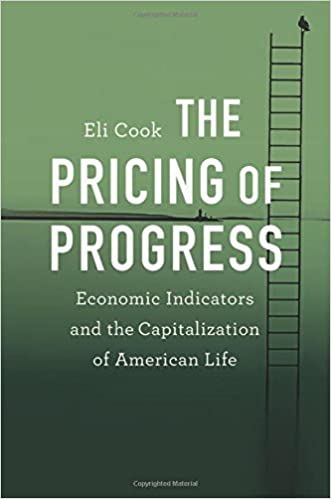Welcome back to the latest installment of our Spotlight/Insight series, featuring winners of S-USIH book and article prizes. Yesterday’s entry can be found here, along with links to previous entries in the series from last month. Today’s interview features Eli Cook, an Assistant Professor of American History at Haifa University in Israel. Dr. Cook won the 2018 S-USIH Annual Book Prize for The Pricing of Progress: Economic Indicators and the Capitalization of American Life.
What are you working on now?
Eli Cook: I’m working on a history of the emergence of the idea of “free choice” that focuses mostly on the 1980s. I just published my first article on this project. Its an intellectual/cultural history of Choose Your Own Adventure (CYOA) books. Despite selling 250 million copies and becoming the fourth most popular children series ever, the CYOA phenomenon has yet to be placed in its larger social, economic or cultural context. Moving away from technological explanations, my article demonstrates how the incredible success of CYOA books stemmed largely from the cultural ascent of individual market choice to the heart of American notions of agency, liberty, subjectivity and selfhood in the 1980s. It seems like the article really struck a nerve with Gen Xers like me. Slate even interviewed me about it last month which was pretty cool.
cultural context. Moving away from technological explanations, my article demonstrates how the incredible success of CYOA books stemmed largely from the cultural ascent of individual market choice to the heart of American notions of agency, liberty, subjectivity and selfhood in the 1980s. It seems like the article really struck a nerve with Gen Xers like me. Slate even interviewed me about it last month which was pretty cool.
Within our field of intellectual history, what topics or approaches
are you excited about?
Eli Cook: I’m excited about the intellectual history of alternatives to capitalism. I think the Corona virus is going to have a massive impact on our world and people are going to be looking for fresh ideas about how we should organize society, allocate resources, and democratize the economy. These are the kind of questions that radical economic thinkers have been dabbling with for centuries but intellectual historians of late have been so (rightfully) focused on the rise of capitalism/neo-liberalism that we haven’t really been supplying the world with the rich repository of creative alternatives to capitalism that thinkers of the past came up with.
This year, our annual meeting theme is “Revolution and Reform.” Can
you reflect on how those ideas connect to your scholarship?
Eli Cook: I’ve always been really interested in the relationship between revolution
and reform. There is obviously a great tension between the two. 
Reforms can better people’s lives in significant ways but in so doing they can also seriously limit the possibility of more structural and revolutionary changes. In recent years I’ve been influenced a lot by
the “corporate liberal” school of New Left historians from the 1960s who viewed the Progressive Era as an age of “reform” that was largely driven by corporate and upper class elites who realized that they needed to make capitalism more “bearable” for the working classes or else they would revolt.

One Thought on this Post
S-USIH Comment Policy
We ask that those who participate in the discussions generated in the Comments section do so with the same decorum as they would in any other academic setting or context. Since the USIH bloggers write under our real names, we would prefer that our commenters also identify themselves by their real name. As our primary goal is to stimulate and engage in fruitful and productive discussion, ad hominem attacks (personal or professional), unnecessary insults, and/or mean-spiritedness have no place in the USIH Blog’s Comments section. Therefore, we reserve the right to remove any comments that contain any of the above and/or are not intended to further the discussion of the topic of the post. We welcome suggestions for corrections to any of our posts. As the official blog of the Society of US Intellectual History, we hope to foster a diverse community of scholars and readers who engage with one another in discussions of US intellectual history, broadly understood.
Thanks for participating in this series, Eli!
Anecdote: When I was a middle-schooler (circa 1982-85), the *only* CYOA books I enjoyed were those produced by the creators of Dungeons and Dragons. That was the only series that captured my imagination, probably due to my experiences as D&D player. Anyway, I love how your project contextualizes those kinds of books in the larger climate of a newfound appreciation for libertarian and free-market ideas. Fascinating.
On your answer to the second question, I just read an Atlantic article on how the DSA has acquired 10,000 new members since the COVID-19 pandemic has begun destroying jobs and, by default, people’s access to health insurance and health care. Maybe an unforeseen consequence of this pandemic mess will be better universal welfare programs and more American socialists.
If the stars line up properly, maybe we blog readers will see you in Boston!? – TL